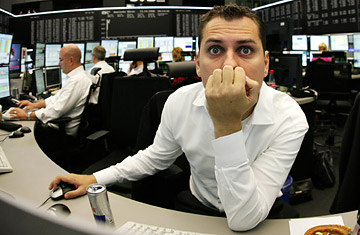
German stock trader looks at his screens at the stock exchange in Frankfurt/Main on October 13, 2008
Markets in Asia and Europe reacted with hope — or at the very least with calm — to moves made on both sides of the Atlantic over the weekend to convince traders to suspend the Great Stock Dump-a-Thon that eviscerated indices for most of the previous week. After Asian markets progressed with modest gains Monday, trading in Europe opened with similar advances, with France's CAC 40 and London's FTSE surging nearly 6% after the morning's opening.
The question now: will it last?
The short answer many European economists give is that it ought to. There are few reasons, they say, why markets shouldn't return to a situation somewhere closer to normal — though they add there was little in macro-terms to justify their bearish frenzy last week. But following Sunday evening's agreement by the 15 leaders of euro-zone countries to accept collective rules to underwrite loans between banks and inject new capital into those facing serious trouble, hope is now rising that the situation in Europe may stabilize. Indeed, euro-group leaders used the most encouraging language they could muster as their summit broke up, underlining the fact that their objectives were as much psychological as financial in thrust.
"I want to tell our compatriots in all the countries of Europe that they can and should have confidence," declared French President Nicolas Sarkozy, who hosted the meeting since France now holds the rotating presidency of the European Union. European Central Bank President Jean-Claude Trichet echoed a nearly identical message of assurance. "The force of unity that we showed today," Trichet said, "is a fundamental element of confidence."
That show of decisive European unity was all the more important in the wake of Saturday's G7 meeting in Washington, where leaders said government intervention would be taken in all the world's major economies to prevent major banking failures and loosen frozen credit. It all proved enough for markets to take heart again, at least for now. By mid-morning, London's FTSE 100 was up 6%, Paris' CAC 40 rose 6.68%, and Frankfurt's DAX jumped 6.25% — a remarkable turn-around from last week's battering that ended Friday with losses of 7% to nearly 9%. Most indices in Asia similarly rebounded, with Hong Kong's Hang Seng rising 6.77%, and Syndey's All Ordinaries up 5.14%. Though the region's showcase Nikkei index remained closed during Japan's public holiday, most Asian markets aside from Taiwan were all posting modest advances.
Despite the measured optimism engendered by that start to an historic week, all eyes will be looking with a mix of hope and fear towards Wall Street as its Monday opening nears.
The fillip of hope was exactly what leaders attending the euro group summit had hoped to inspire, but they were careful to note it was only a beginning. European Commission President José Manuel Barroso, for example, stressed the collective package "isn't of an immediate miracle", and many more trials and jittery nerves would have to be overcome before the nightmare of the past months would be over. Still, the mere framework of a strategy proved sufficient to calm the fear that that drove last week's panic-driven sell-off.
The euro group plan aims at freeing up credit markets by underwriting loans banks make to one another — activity that has virtually halted amid general suspicion about borrowers' ability to reimburse funds — and resume the lending to companies and consumers necessary for economic growth. The euro group package will also allow national governments to buy preferred shares through capital injections to save swamped banks from failing, and allowing those in less perilous condition to fully sanitize their finances and return to normal operation. As such, the euro group plan was largely inspired by the rescue package British Prime Minister Gordon Brown rolled out the previous week, which matched $438 billion loan guarantees with up to $88 billion in capital investments to save troubled banks from failure. On Monday, the U.K. government said it would spend up to $63 billion in additional funds to take substantial stakes in three of the nation's leading banks.
Though the common rules adopted under the euro-group plan will still be applied at the national level at the discretion of individual governments, the action marks the first concerted effort to address the chaos in Europe following weeks of dislocated, often controversial responses by each country on a case-by-case basis. In announcing their plan, Sarkozy and his partners applauded both its comprehensive scope and the unity of support it enjoys.
"The crisis has over the past few days entered into a phase that makes it intolerable to opt for procrastination and a go-it-alone approach," Sarkozy said. "This plan treats all aspects of the financial crisis." That's not to say further treatment won't be necessary.
